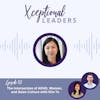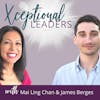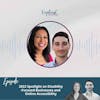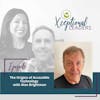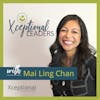Becoming an Exceptional Leader with Michael Zalle
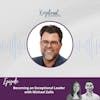
Mai Ling sits down with founder and CEO of YellowBird, Michael Zalle, to talk about being a successful leader as a person with a disability. As a veteran tech entrepreneur, Michael pulls from his extensive experience in the business world to share...
Mai Ling sits down with founder and CEO of YellowBird, Michael Zalle, to talk about being a successful leader as a person with a disability. As a veteran tech entrepreneur, Michael pulls from his extensive experience in the business world to share about when it might be advantageous to disclose a disability to potential investors. He also talks about embracing your own story and using it to your advantage and he also shares some thoughts on the role of authenticity in business. This is a value-packed episode!
Contact Mai Ling: MLC at mailingchan.com
Contact James: James at slptransitions.com
Michael Zalle 0:01
And I've embraced, in fact, what I think my next chapter of my life is going to be is telling this story and telling my story. And now I am embracing it, but it took till I was 45 years old to actually make that part of my story.
Mai Ling 0:22
You're listening to the exceptional leaders podcast each week, we give you a front-row seat to our conversations with new and successful exceptional entrepreneurs and thought leaders making an impact. They share their intimate experience so you can start, grow and expand your impact on the world. I'm mailing a Mai Ling Chan.com. And James is on vacation this week, so you have me all to yourself. This week, we talked with Michael Zalle, the founder and CEO of Yellowbird. With a spotlight on the gig economy for health and safety professionals, and how he identified the need to support this area. We also venture into Michael's personal journey to defining his personal identity, and how it relates to his professional role and leadership. This is an interesting story as Michael's in the beginning stages of unifying his representation and sharing his experience in order to help other founders like you who might be interested in considering the best avenues for incorporating your multifaceted background into what is your personal brand and your personal messaging. And wondering if you would include your disability if you have one, into your entrepreneurial and leadership plants. And so this has been an amazing journey together with Michael. And I'm really proud that he wanted to join the show and to share his story. This also makes me think of Brene Brown and her book, dare to lead, where she teaches us about the power of vulnerability. I also had a very personal experience with that about probably five or six years ago when I started to read that book. And I remember thinking, what you want me to tell people that I'm not perfect. And I think that's pretty funny now, because just doing this show, I hope that you have all realized that there's a lot that I don't know, and I am perfectly fine to ask good questions, because I'm always thinking of you, our listener, and trying to get you the little pearls of wisdom and tips that will help you. This also brings me to share our upcoming virtual conference exceptional alliances. It's an event that is coming on October 20. And it's focused totally on accessibility. And what this means today, there will be 40 speakers, and it will be different than any of the conferences you have gone to because these will all be very fast-paced roundtable discussions and discussions that you as an attendee can be a part of it. So this is not a sit and get Michael Zalle actually will be joining one of the sessions as a panel presenter and sharing his perspective as well as other leaders, so that you will have a comprehensive understanding of the real issues that people are experiencing right now regarding access, and how you can make a difference in how the world continues to be designed. So please follow exceptional lab on LinkedIn, Instagram, Facebook, to get more info about the conference and how to register for free. We also want to tell you, we love it so much that you're continuing to follow our pages and reach out to us, we definitely appreciate that you continue to refer amazing guests to us. So please keep that coming. And also giving us any feedback on how we can make the show even better, we're really excited and that we are continuing to grow in our listenership and the countries that we've been reaching. So thank you so much. All right. So let's jump to the conversation with Michael. Today's episode is really special for me, because I'm actually in person with Michael Zalle, the founder and CEO of Yellowbird. So welcome, Mike.
Michael Zalle 03:47
Thank you. Thanks for having me.
Mai Ling 03:49
Fantastic. So Michael, and I met as a referral. And this is how I always do it. I first started on stalking people on LinkedIn. But this is actually a better story where I met someone and he was like, you know, what, are you in Arizona? And I said, Yeah, and he's like, Oh, my gosh, do you know Michael Zalle? And I said, No, I don't. And that's actually led me on this new journey of realizing there's a lot of people here in my hometown, not my hometown, but my where I live, that I should be meeting and connecting with and so Michael and I got to meet in person at a coffee shop, press coffee, and I will give them that plug. I love press coffee. And we just started going on and on about all the ways that we collaborate and support each other. And of course, I said, You need to be on the so welcome.
Michael Zalle 4:33
Thank you for having me. I'm excited to be here.
Mai Ling 4:35
Excellent. So our audience are people who are in a stage of growth. They have an idea. They're creating something and they are listening in and listening hard to people like yourself, are an entrepreneur and you already have traction and you're really doing something big. I think your story is a little bit different in that what you're offering is not specific for the disability community. But I think your story is apt salutely interesting to us, because you are somebody who identifies with having a disability. But that hasn't been the way that you are, I would say branding, marketing, sharing your company, is a really interesting one. So I guess start with, how did you get the idea of real work.
Michael Zalle 5:18
So my background is actually in communications and not verbal communications like this, but actually communications of phone and internet. And I was doing in, in satellite communications. And one of the high consequence industries that we were focused on a lot, were things like mining and oil and gas and things to that effect, of which, because of the nature of what we do, you had a lot of risk and health concerns for the employees out in the field. And so I would sell, essentially, the company would offer communications in that space, when we sold that business, and I decided what I wanted to do next, I really liked the gig economy. But I don't like the marginalization of human beings. And I think that the gig economy does a lot of good for people. But I think it also does a lot of harm, because the opportunity to actually progress in your life. And in your career, it's not quite as accessible as people will often think. So the concept of Yellowbird, which is to match professionals in the health and safety space, using a gig economy type of methodology came to me just through thinking that through and watching some other gig economy companies and seeing I really liked the value, and I liked the technology, but I didn't like the model. And so we've shifted the model, and it's gone very, very well.
Mai Ling 6:41
That's excellent. So I have personally loved the gig economy, idea, the marketplace, and I've built a couple of companies around it. And I'm seeing more apps that are coming out where you can plug in put in your information, and then the people that need you can source. Yeah, brilliant. And your space is really interesting. I know when I went to the website, the first time I was kind of like, what am I looking at? Because being in the Health and Rehab space, I had really no idea concept. So did you have a background in business and marketing and all of that?
Michael Zalle 7:10
Yeah, so I'm, my background is actually in technology. From the time I was about 17 years old, I was selling computer systems when I was a kid. And I was very fortunate to be in the Southern California in the 90s, when the internet boom was just happening, had the opportunity to, you know, be in sales and marketing, which I did well, right place at the right time, a lot of drive still have a lot of drive, it's part of my one of my superpowers is I just, I have a lot of energy. And especially when I'm passionate about something.
Mai Ling 7:43
I love this. I'm sitting in my hands here because I'm like, I want to save something.
Michael Zalle 7:47
But yeah, it is one of those things that I have always been a person who saw how to sell. But more importantly, I don't sell anything, what I do is I work with people and try and find opportunity to match, essentially what Yelper does, which is matching a need and matching a service in our circumstance that gets very complex. And the more complex, the better it is in my world. And that's what I've always been drawn to. I don't like commodities. I like complexity. That's my, that's my thing.
Mai Ling 8:19
Excellent. To go back. The reason why I got excited is Michael has been with me on my earlier journey of when I first received a identification, late stage identification of having ADHD as an adult. And we connected as most people do with me when they find that out. And they say, I probably have that also. But I believe Michael, you already have no, right.
Michael Zalle 8:41
Yes, I and I actually was later in life that I came to the realization as well, because of my son's journey, and my son has been going through various things in his in his life. And as they were describing these characteristics, I realized when I see some of them and my parents and my father, I see a lot of them and myself and I saw some of them and Nick fortunately, he's now in a in an age of 18 that he is able to get ahead of it, where I just kind of worked against my heart with anyone how you anyone how you define it, it my your greatest attributes are also some of your greatest negatives in your in your personality types as well. So are your characteristics. So yes, I do have a very similar journey to you. Which there's nothing wrong with being a little a little OCD on some things, especially if they're for the betterment of others and your business.
Mai Ling 9:37
Absolutely. And then just being just high functioning people you know, getting shit done. Yeah, but yeah, absolutely. Yeah. Lots of spinning plates. And I know, Michael, that you have a lot of strategies. Yes, like I do. And is that something that you can share? Because being an entrepreneur like there are so many things that go on in a day, you know, and so many things that you want to plan for and so many things you need to catch up with like, what are your strategies?
Michael Zalle 10:02
The one that has worked, the best for me over time has been to actually slow down before I shoot off that email before I respond. I'm very from the hip. And my wife used to call it ready fire aim. And because of that, I've learned as much as I can, I still have this tendency, I will always have this tendency, but to stop, read what you wrote, is at the right time, you know, those those types of methodologies, those types of processes, I also tried to, I've gotten a lot better at understanding what is an emergency? And what is something that I just feel passionate about doing? Oh, my gosh, yeah, everything's an emergency in my world sometimes. And I have to realize that this is not actually my number one priority.
Mai Ling 10:51
It's shiny, little things
Michael Zalle 10:52
Shiny ittle things, except the good news is, is that when you do have a priority, and you do know you're number one, you can get very focused on it. And you can obsess over it and raising capital, which I have done over the last two years building a business we've grown 500% a year we are Yeah, we're growing very, very well. Part of that has to do with getting it funded, getting the right deals in place, pushing people forward, all those types of things, is also one of the things that I think I'm uniquely qualified to do because I have ADHD as part of who I am, you know, so that piece is actually a superpower as well, depending upon how you how you look at it. No, I'm not very, you know, yes, I do have those characteristics. But I wouldn't really consider that to be something that is ever hindered me in most circumstances. But I was in the right place at the right time. And I've gotten to a position where I was using that salesmanship, that marketing ability, my technical brain combined with my energy worked out well for me, right now, I love that, but it could have gone the other way too.
Mai Ling 11:58
Okay, so for our listener, this is where you need to lean in, turn the volume up a little bit, because Michael is going to share the delicate balance of when do you share that you have a disability, especially when you're raising capital? How do you share that in your marketing? You know, and what are your tips for us?
Michael Zalle 12:14
Well, first, something that's interesting is that this is the first time I've ever actually talked about ADHD as far as a disability is concerned, because I was actually born as an amputee. So in my below elbow, right arm amputee, so the umbilical cord, or they call it embryonic rings got wrapped around my hand when I was in utero. And so I was born with no right hand, essentially, I was also born with a neurological deficit with spina bifida that actually healed itself, I have a tethered spinal cord. So I have my parents had jackpot in a kid. Fortunately, or unfortunately, depending upon how you look at it, it was the 70s people didn't know that I was gonna be born like I was, and my parents did a great job of just dealing with what life gave them. And so I don't often have the option to tell people if I have a disability, because when I meet them, they it's on the outside. And that's actually a blessing. Now, I realized that as a child, it really sucked. As a child, you know, you just want to blend in, you want to be like everybody else. Having your disability on the inside can be a blessing. Because you can choose when and how you want to disclose that. It's like any other physical difference, whether it be a nationality, whether it be a gender, whether it be physical disability, you can't hide that you just have to deal with it. So I never really had that choice. That being said, when you want to focus on it is really the question when and it's the same answer. It's the same answer, whether it's internal or external, which is how much do you trust the person that you're talking with? How much do you feel that is going to be something that has material, I often did not talk about my hand, even with people who could physically see it. I had friends and people for years that never even knew what the story was. And they just forgot, you get to know me and they know who I am. And they weren't me about me as a person, as a father, and as a husband. All these are the things that I am. And, you know, I've had friends I've had for years, they finally said, Hey, what's the story with your hand is like, oh, man, I never even talked to you about that. That being said, when I was a kid, I did not like people talking about my hand. I wanted to ignore it. And so there's different stages. There's no quick and easy answer to that question. It's a personal journey. It is a personal journey. And if you're doing it for the right reasons, if you're talking about it for the right reasons, if you want people to know, I look at everything I do as educating communities and trying to help others understand my perspective on things, and I think it's very good. And we'll get into why Yellowbird I think is is uniquely designed for the benefit of For people with disabilities, and even those who are homebound or can't are immobile, and I'll get to that in a little bit, but, you know, I also don't think that your physical or mental or emotional characteristic define who you are, it's a part of who you are. And so when do you decide to do that? That's a personal decision. And it's difficult. It's a difficult decision, because I think there's no quick answer to that. There's no, there's no roadmap there. Some people will enter a room and talk about it. And some people will never talk about it, especially if they feel that they're not in a safe space. And they should still talk about it. But we can understand why they wouldn't. As much as I wish that wasn't the case. That is, you have to be in an environment where you feel like you can speak about these things.
Mai Ling 15:54
If you're like me, you can't get enough of books, podcasts, blogs, and other ways to find out how to create grow and scale. That's why I brought together 43 disability focus leaders to give you more of what you're looking for, you will hear their stories and three best selling books, which focus on general offerings, augmentative, and alternative communication, and speech language pathology, I invite you to search for becoming an exceptional leader on Amazon. So you can learn intimate startup pearls of wisdom, and keep growing your brilliant idea. Now, let's get back to our amazing interview. Can you share is there a time when you were let's say pitching to an important group without you know divulging anything or any issues, when you really had to think about is this part of my presentation? Because there you know, in your slide, pitch your slide deck, you know, people are saying the founder is a founder with the disability and you know, they have ADHD because the app that they're creating, you know, has something to do with a neurodiversity. Okay, but in your case, obviously, there isn't a one to one correlation, at least not up until this point. Right? So have you ever had to like really consider that?
Michael Zalle 17:01
Yes. So Michelle, who is my co-founder and COO, talked to me about whether or not we wanted to register as a disability owned business? Oh, that's a great question. And I had never done that. In any of my even though I was a government contractor for years. And, you know, working with FEMA and other government agencies, you think I would have done something to that effect, but I never had. And as the majority owner of the company, I'm able to do those registrations. And I decided, she actually said, Look, if you were a female, if you were African American, if you were some other, some other diverse, you know, a organic, disadvantaged population, thank you. You'd have no issue with that. And I had to really think about it. And I've embraced, in fact, what I'm thinking, my next chapter of my life is going to be is telling this story and telling my story. And now I am embracing it. But it took till I was 45 years old to actually make that part of my story. Because I didn't think it was in maybe I'm foolish, but I didn't think it was actually pertinent to my story.
Mai Ling 18:08
I get that so often, it's, it's amazing. What do you think the advantage is now for you and your like, I guess your customers, your user base for you to share your story?
Michael Zalle 18:18
I think that business is about authenticity. And I know that is such a cliche, and people use authenticity, like its currency, but the reality is, is that if you are able to show who you truly are, as a, you know, I am Yellowbird. And Gilbert is me. I mean, this was my baby. At the end of the day, if you don't like the way Yellowbird is treating you or you don't like it is a reflection of me. And by the way, my wife hates that statement. She goes, No Yellowbird is not you Yellowbird is its own company, Alberta will go on without you or anything else. But the values, the culture, the belief in empowering people superpowers and finding the perfect job for folks and finding the perfect opportunity to make extra money. That is what I believe in as a human and a and so I don't think of those separate. Part of that is the willingness to be vulnerable and to talk about these things. And if you are putting up a front, I don't think you can be a good leader. And so for me, that's my mission. I want to be a good leader, I want people to buy into what we're trying to accomplish. It only recently in this last round of capital raise and in this last round of business, have I put that out there I raised capital from to impact investors. And one of their philosophies is actually those who have an impact thesis, somebody who will put money behind you know, they want somebody who either helps those who have a disability or is in a business that can help somebody with a disability. You don't have to actually be a disabled founder and that's where our space says all right. And so from that perspective, have someone on your team on your team who gets it? And in my circumstance, I get it physically, but there are other. You know, I think that it's one of the conversations that we are uniquely qualified to do in our platform. There's interesting discussions internally such as, what do you do for photos on profiles? What do you do for names, bias is real, and what kind of biases Do you want to filter for, make sure that you are presenting people's skills and capabilities and knowledge and passion, not the color of their skin, their gender, their, you know, their, their orientation, or anything like that. And so, but that doesn't make somebody uniquely who they are. And so by removing that, you're also doing them a disadvantage. So we have these conversations internally, about, you know, the gig economy is one of these things that you are choosing who you work with in many circumstances. But that can also be bad that can reinforce biases. So that's part of our process. So it's been a very interesting journey, not one that I expected. When I started, when I started...
Mai Ling 21:09
That's a whole nother episode. Yes. But this is also making me think of mantra. Are you familiar with the new app out now for matching neurodiverse contractors with employers or even just for full, you know, employee?
Michael Zalle 21:20
No, I'm not familiar with them. But I liked the idea. Is it specialized like in our, in our world, we're an environmental health and safety. So we focus primarily on health and safety matters? Are they specialized in something in particular,
Mai Ling 21:33
You know, I should deep dive into that. I know, tech is very big, right now. So there's, I mean, it's an amazing platform, it just started. And it's, it's doing very well, but this is definitely that kind of going into a single vertical, you know, of of a disability, and being able to match people according to their unique talents rather than their dis ability, which are love. Yes. Yes. I also love and I want to thank you for being vulnerable. And it reminds me of Brene Brown's book, dare to lead. ever get the chance? Yeah. When I read it, yeah, I remember reading it the first time years ago and thinking this is ridiculous. Why would I tell everybody all my you know, inequities and what I'm not good at, and, and be honest with them, I'm perfect. And that's how you lead is showing people perfection, right. And obviously, by you know, the middle of the book, you finally realize this exactly what you're saying that being genuine, you know, being open, being connected to people is the way to actually lead and to get people to buy in, be a part of your team.
Michael Zalle 22:35
Yes. If you walk around this office here, because you're actually in my office, you'll find that I am surrounded by people very much smarter than I am. And I'm proud of that. And they're smarter in many, many ways. I'm smarter than others. But I believe that you need to be honest about where you fall short and double down on those things. And it's so difficult to do, especially in the, you know, the social media world that we live in, nobody's pretty enough. Nobody's smart enough. Nobody's kids have all straight A's. You know, even using the term authenticity, you know, I'm going to go out, I'm going to show people how authentic I am is like, No, that is not Authenticity. Authenticity is the ability to say, yeah, I totally screwed up. And I'm not as good as I wish I were in XYZ area and looking bad. And saying, Yep, we really looked bad there. But we're going to we're going to fix that, you know, and that's, that's business. That's life saving business. That's just life. So that's my I. I think that the the business world that we live in right now, and just the world that we live in right now is giving people a false sense of perfection.
Mai Ling 23:47
Definitely. Yeah, what you see out there is not real with all the filters, right? Yep. Interesting. Okay. Well, they say that in order to achieve your goals, you need accountability. Yeah. And there's research around this. And so yes, let's do this. So Michael and I are gonna start working together to develop his speaking presence and his representation for his company as a founder with a disability. And, in your own words, what would you say would be one of your KPIs? Like, how would you know that I feel that looking back, I would have accomplished what I set out to do?
Michael Zalle 24:20
if I'm able to get a message that will help others out to a broad enough market. And so it really comes down to performance. If my message is resonating, if I'm able to communicate the message that we are going to structure and make sure that it's in line with not just me but with something that I hope to help our community then that success is not dollars and cents. I've been very fortunate to be able to address the dollars and cents side of my life. It's not done but fine on from that perspective. But it's really about getting the message out. And I think if I can spend more time doing this, talking about this as a subject, Yellowbird does just fine. And YellowBird continues to grow. And we're doing, you know, we did more revenue last month than we did our first year.
Mai Ling 25:19
Wow. So in how many years? Has it been?
Michael Zalle 25:20
We just entered your fourth year. So yeah, we were doing quite well, it's, it's really a blessing. But that being said, I no longer have to spend all of my days, you know, worrying solely about survival. And so now I want the message to be about how to help others, which is what Yellowbird really is all about, you know, it's an empowerment platform. And the quick answer, by the way, going back to your very first question, the original idea of Yellowbird was because people were retiring from the industry, I wanted to give them an opportunity to consult on their time on their terms. You know, so if there are a lot of people, right, driving Uber right now that are in their 60s and 70s. Yeah, and they are actually very competent, very good, very qualified people in my industry, that left the industry, and they literally left all that knowledge in their head, and they're gone. And so the original concept of Yellowbird was to actually empower the retiring population. And now we've grown so much beyond that now, but that was the original idea. And it's the same philosophy. I keeps using the term superpower, but whatever that knowledge that is, whatever that unique capability is, if you're a trainer, if you're a document reviewer, if you are a speaker, if you are somebody who goes out and does assessments, whatever that thing is that you want to do, I want to give you the opportunity to choose to do that.
Mai Ling 26:40
Excellent. Well, Michael, thank you for taking your first steps on your journey here with us. And how can we continue to follow you and watch you just unfold and flower?
Michael Zalle 26:50
Follow me on LinkedIn, it's Michael dot Z-A-L-L-E. And goyellowbird.com It's G-O yellowbird.com. And also all of our handles are goYellowbird so you know, any hashtag go Yellowbird you'll find us. I do publish a fair amount on LinkedIn and on Facebook, so feel free to find me there as well. That's those are the best places to find me.
Mai Ling 27:15
Excellent. Thank you for joining us.
Michael Zalle 27:18
Sure. My pleasure.
Mai Ling 27:20
We hope you enjoyed this episode and invite you to leave us a review on Apple podcasts and Spotify and share the show with people you think will find value from it. This helps the show a lot for have a great guest referral, reach out to us at xleaders@gmail.com.
James Berges 27:35
And if you want exclusive tips on becoming an exceptional leader delivered straight to your inbox, just go to xeptionalleaders.com and sign up for our mailing list. Thanks for listening.
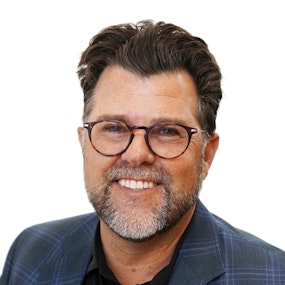
Michael Zalle
Founder & CEO of YellowBird
Michael Zalle is the Founder and CEO of YellowBird. He is responsible for creating, building, and launching new business concepts and companies. Michael’s belief that technology can change the world with the right focus and purpose has served him well and has positively impacted thousands of lives and families.
A 25-year tech career with multiple exits, “doing well while doing good” philosophy keeps his energy high and drives creativity to commercial novel business models and operationalizes innovative technologies and platforms. His multiple business exits are the result of hundreds, perhaps thousands, of committed and excited difference-makers on his teams. Today’s YellowBird mission, to create a high-impact knowledge worker platform while saving lives, resonates more than ever before.
Michael’s college journey began at San Francisco State University and continued through to Pepperdine University Graziadio Business School, all while working full-time and traveling internationally at age 19. As a lifelong member and mentor for the Amputee Coalition of America, he enjoys the time he is able to invest in mentoring kids with physical challenges. As a successful adult, he can now represent the disability community on Panels, Boards, in Washington DC and as an active Entrepreneur in Residence with the 2Gether International organization.
Married 23 years with two very accomplished children, one in high school and one in college, Michael spends most of his free time enjoying the simple moments with them. He enjoys traveling and engages in a variety of… Read More
New to Xceptional Leaders with Mai Ling Chan & James Berges?
Here are some great episodes to start with. Or, check out episodes by topic.






